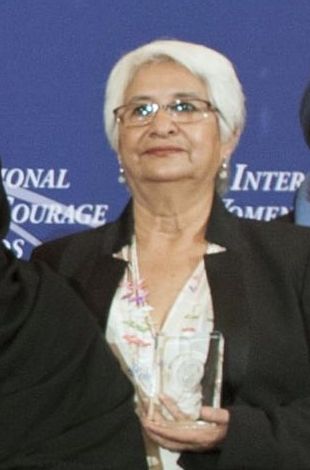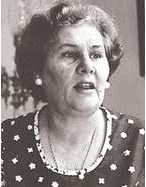Related Research Articles

Alfredo Stroessner Matiauda was a Paraguayan army officer, politician, and dictator who served as President of Paraguay from 15 August 1954 until his overthrow from power on 3 February 1989. His dictatorship is commonly referred inside Paraguay as El Stronato.
Women's suffrage is the right of women to vote in elections. Several instances occurred in recent centuries where women were selectively given, then stripped of, the right to vote. In Sweden, conditional women's suffrage was in effect during the Age of Liberty (1718–1772), as well as in Revolutionary and early-independence New Jersey (1776–1807) in the US.

The cinema of Paraguay has historically been small. However, this has begun to change in recent years with films like El Toque del Oboe (1998); María Escobar (2002); O Amigo Dunor (2005), which competed for Best Movie in the Rotterdam International Film Festival; Hamaca Paraguaya (2006), which was screened at the Cannes Film Festival, gaining critical acclaim both in Paraguay and abroad; 7 cajas (2012); Latas Vacías (2014); and Luna de Cigarras (2014).
The Permanent Assembly for Human Rights is an Argentine non-governmental human rights organization; founded in 1975. According to its official website the organization is the product of a "call from people coming from distinct areas: the church, politics, Human Rights, sciences, culture, and labour Argentines in response to the increasing violence and the collapse of the most elemental Human Rights in the country".
Sendero ('Path') was a Spanish-language newspaper in Paraguay, published by the Paraguayan Episcopal Conference (CEP). Initially it was a fortnightly and was later converted into a weekly newspaper.
The 1958Paraguayan general strike was a general strike organized in Paraguay in August 1958, marking the first national general strike in the country. The strike was called by the Confederación Paraguaya de Trabajadores, with demand such as a 30% raise in salaries, a general declaration of amnesty, a lifting of the state of emergency, a more equitable economic policy, securing the freedom to participate in political and trade union activities and the holding of a constituent assembly.

Women in Paraguay face challenges to their rights. Faced by socioeconomic inequalities and gender pay gap, they experienced significant cultural changes since 1990 as a result of constitutional and legal expansions of women's rights and evolving cultural attitudes. The legal and government institutions currently existing in Paraguay were developed in part through the efforts of feminist organizations in the country that held significant awareness-raising campaigns during the 1990s to formalize the guarantees of women's rights. UN Women supports the Paraguayan State in the challenge to extend women's rights, to fight for gender equality, as well as women's empowerment. It also ensures that women's voices are heard and create more opportunities for women.

The dictatorship of Alfredo Stroessner, colloquially known as the Stronismo or Stronato, was the period of almost 35 years in the history of Paraguay in which army general Alfredo Stroessner ruled the country as a de facto one-party state under an authoritarian military dictatorship, from 15 August 1954 to 3 February 1989.

Rosa Julieta Montaño Salvatierra is a Bolivian attorney, human rights defender, woman's rights activist, feminist writer and a 2015 winner of the US State Department's International Women of Courage Award.
Mercedes Sandoval de Hempel was a Paraguayan lawyer and feminist. She was one of the leading proponents of women's suffrage in the country, drafting the Anteproyecto de Ley de Reforma Parcial del Código Civil. In 1992, the amendment of the Paraguayan Civil Code finally recognized equality between men and women. The wording of Article 1 of Law 704/61 was simple: “Reconócese a la mujer los mismos derechos y obligaciones políticos que al hombre.”
Virginia Carlota Corvalán (1900-1957), was a Paraguayan lawyer and feminist.

Ángela Acuña Braun, also known as Ángela Acuña de Chacón,, a Costa Rican lawyer, women's rights pioneer and ambassador, was the first woman to graduate as a lawyer in Central America. Orphaned at the age of 12, she was raised by her maternal aunt and uncle, attending elementary school and beginning high school in Costa Rica. She continued her education in France and England, gaining exposure to the ideas of women's rights. Returning to Costa Rica in 1912, she published articles in support of women's equality. She attended the boys' lyceum or high school where she passed the bachillerato, a prerequisite for entering law school. She embarked on law studies in 1913, leading to a bachelor's degree in 1916. As women were barred from entering the profession, Acuña immediately presented a reform to the civil code allowing this, which was adopted.

Carmen Clemente Travieso (1900–1983) was a Venezuelan journalist and women's rights activist. She was the first graduate of the Central University of Venezuela as a reporter and one of the first women employed as a full-time journalist in Venezuela. She was one of the earliest group of women who joined the Communist Party of Venezuela and worked actively for women's suffrage. She was a co-founder of an organization in favor of prison reform and a co-founder of the Venezuelan Association of Journalists.

Carmen Casco de Lara Castro was a Paraguayan teacher, women's and human rights advocate, and politician. She established one of the first independent human rights organizations in Latin America and fought for both women's equality and an end to state-sponsored terrorism under the dictatorship of Alfredo Stroessner. She was influential in passing legislation for pay equity and maternity rights, as well as securing the repeal of laws curtailing basic human rights.
Margarita Morselli is an artist who is considered a pioneer in the use of a video as a form of artistic expression in Paraguay. The work she presented was on abstraction with references to real spaces.
National Council of Women was a women's organization in Chile, founded in 1919. It was one of the first women's organizations in Chile.
Isabel Arrúa Vallejo or Vallejos (1913/1914-2006) was a Paraguayan teacher, diplomat and feminist. She was Paraguay's first woman with diplomatic rank, as attaché of the Embassy of Paraguay to Brazil from 1945 to 1948.
Antonio Campos Alum was a Paraguayan politician and head of the National Directorate of Technical Affairs, a law enforcement agency during the dictatorship of Alfredo Stroessner.
Ramón Aquino was a Paraguayan far-right politician from the Colorado Party, known as the leader of the Garroteros militia during the dictatorship of Alfredo Stroessner.
References
- ↑ Rodríguez, Pablo (1 January 2004). La familia en Iberoamérica, 1550–1980. Universidad Externado de Colombia. ISBN 978-958-698-134-7.
- ↑ The Paraguay Reader: History, Culture, Politics. (2012). USA: Duke University Press. 435
- ↑ The Paraguay Reader: History, Culture, Politics. (2012). USA: Duke University Press. 435
- ↑ Przeworski, Adam; Shin, Kong Joo; Xi, Tianyang (September 26, 2013). "A Simple Partisan Calculus of Women's Suffrage" (PDF). Faculdade de Filosofia, Letras e Ciências Humanas. São Paulo, Brazil: Universidade de São Paulo. p. 22. Archived from the original (PDF) on 9 September 2017. Retrieved 9 September 2017.